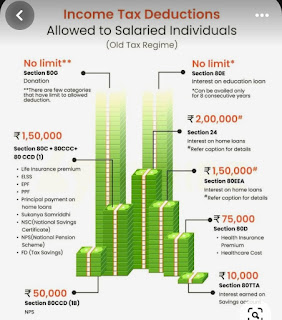21 Ways to Save Tax From Salary:

21 Ways to Save Tax From Salary:
You must pay special attention to the financial items that can reduce your tax liability if you want to save a sizable portion of your income in India. Sections 80C, 80CCC, and 80CCD in India allow professionals who are salaried to reduce their tax obligations.
It’s highly likely that you have not planned your taxes adequately if you feel like you have been paying a significant portion of your income in taxes. There are many legitimate strategies to reduce your tax liability. The Income Tax Act of India enables citizens to reduce their tax obligations through deductions. When filing their tax returns, people can claim the deductions.
For Assesses, submitting an Income Tax Return (ITR) is a difficult process. Long documentation procedures, keeping track of numerous documents, and matching requirements compel people to make mistakes frequently.
How to Save Tax From Salary:

Here are some suggestions to help you cut your tax bill:
1. Housing Loan u/s 24
Section 24 of the Income Tax Act allows you to deduct up to Rs 2,00,000 in interest from your taxable income each financial year. The property must be purchased, built, repaired, renewed, or rebuilt in order to use the loan. Additionally, you are eligible for a tax deduction of up to Rs 1.5 lakhs for principal repayment under section 80C.
2. Chapter VI Deductions:
Your tax obligation decreases with lesser taxable income. There are a variety of measures that you might use to reduce your taxable income. For instance, section 80C allows you to annually save Rs. 1.5 lakhs. FDs, Equity Linked Savings Schemes, insurance policies, etc. are examples of 80C investments. Additional Section 80 deductions that lower your tax burden include 80D, 80E, 80GG, 80U, and many others. To learn more about tax-saving choices, see 6 Reasons Why ELSS is Better Than Other Tax Saving Instruments and 19 Ways to Save This Tax 2019.
Your employer withholds a portion of your total income tax each month called Tax Deducted at Source (TDS). For a person earning a salary, this is a sizable portion. Additionally, the
3. Health Insurance u/s 80D
Under section 80D, a salaried employee may deduct the cost of their medical insurance. They must get such health or medical insurance to protect their parents, dependent children, and spouse. You are entitled to a reimbursement of Rs. 25,000 for insurance premiums paid to cover the insured’s spouse and dependent children. Additional insurance premiums of Rs. 25,000 might be claimed against those that were paid to cover the lives of your parents. You may be able to claim Rs 50,000 rather than Rs 25,000 if the parent is a senior citizen.
4. House Rent Allowance (HRA) 10 (13A)
People who rent their homes or apartments can use HRA to reduce their tax obligations. Taxes are either entirely or partially excluded from HRA.
5. Leave Travel Allowance (LTA)
An employee is eligible for LTA exemption for domestic travel inside India. This exception only applies to the trip’s shortest leg. This can only be claimed for trips taken with your spouse, kids, and parents. As a result, you may request this exemption after incurring the costs and giving your employers the invoices.
6. Employee Contribution to Provident Fund (PF)
A social security programme known as the provident fund requires equal monthly contributions from the employee and the employer for the employee’s pension and provident fund. This amounts to 12% of the base pay. The interest rate, which is approximately 8.65%, is set by the government. The returns are therefore tax-free when they mature. EPF contributions may also be claimed.
7. Standard Deduction
The 2018 budget reinstated the Standard Deduction. The medical and transportation deductions were replaced by this one. With the introduction of the 2019 budget, employees can now deduct a flat Rs. 50,000 (formerly Rs. 40,000) from their overall income, lowering their tax burden.
8. Professional Tax
There is a 2,500 rupee professional tax that the state imposes. Employers withhold it from employees’ paychecks and deposit it with state governments. The deduction from your salary is therefore permitted.
9. Exemption of Leave Encashment
Some employers allow you to roll over a certain number of leave days and use them later, while others prefer that you use them all up immediately.
10. Section 89 Rebate:
Any pay received in advance or arrears is eligible for tax relief under Section 89(1).



Comments
Post a Comment